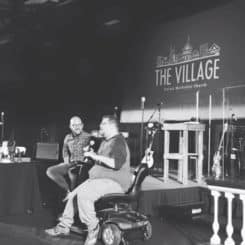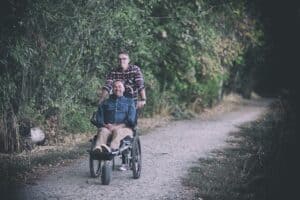
By Matt Curcio
If you haven’t heard yet, Donald Trump will take office in January 2017. Some of those reading this voted for him, some of you are still reeling from his win. I am not here to stretch out those discussions any further. Rather, I would like to shed light on the voice of a community that has been overlooked throughout all of human history.
In recent years we have labeled this marginalized group as “people with disabilities.” In case you are just tuning into Disability Advocacy, terms like crippled, handicapped and others are not acceptable labels. I actually cringed writing those words, and couldn’t bring myself to type out the “r-word.”
I am far from being too sensitive—just ask any of my friends—but these words have years of hurt and ridicule tied to them that many people with disabilities will never un-live.
I recently read an article that stated people with disabilities will die under the presidency of Donald Trump, eloquently expressing the vast fear that those in the disability community are currently experiencing. As an advocate, minister and a person with a disability, I want you to know that this fear is not unfounded, but more importantly, it is rippling through a community that the Church has failed throughout history.
The majority of my work through my ministry Break The Roof involves going to churches around the country and showing them just how much they have missed the mark on loving and embracing our brothers and sisters with disabilities and chronic illnesses.
I have an uncanny ability to not be able to stop talking—yet there is no single place in my life that I have felt more voiceless than within the body of Christ. I expect to be left out of the secular culture; I dare you to find more than ten popular activists or writers who include ableism in their list of offenses against marginalized communities. I am not bitter about this fact, but I am extremely aware that as time moves forward and our culture in America begins to shift again, those who will surely fall through the crack are those who cannot physically stand up for themselves. Those whose voices we will not hear are those who cannot verbalize their needs.
1 in 5 Americans are permanently disabled, yet those numbers are not even close to being reflected appropriately in the majority of Christian churches.
I have written and spoken until my face and hands feel numb about the 68% unemployment rate of those with disabilities. About the fact that 1 in 5 Americans are permanently disabled, yet those numbers are not even close to being reflected appropriately in the majority of Christian churches. About the exclusion of people with disabilities in theological institutions, and about unformed theologies regarding disability. About the fact that the majority of able-bodied people reading this will one day be disabled in some manner.
Take your time to let that one set in. Sorry for giving you a scare if that truth alarms you.
I think the time has come to stop misunderstanding how the Body of Christ is supposed to work. People with disabilities are just as much a vital part of kingdom-building work as you or anyone else. I can write until you are bored out of your mind about why there is such a disparity between the Church and how it relates to people with disabilities, but I rather take this time to call you all to action.
Despite the fear that is running rampant these days and dragging its claws through my people, your people, I find the hope that exists in the Body of Christ, God’s own hands and feet, to be overwhelming and contagious. We have every tool necessary to become co-laborers with our brothers and sisters with disabilities. God calls us to be a “voice to the voiceless,” let us take this one step further and work to give an entire community its voice.
Disability knows no gender, no age, no religion, no orientation, no class. We all have the potential to become disabled, and this community is both hidden and in plain sight. Now is the time to take action, to use our own voices and open our ears and hearts to those we often forget.
I want to take this time to share some simple, proactive thoughts on how you can move towards inclusion of those with disabilities:
1. Set aside your own fears and anxieties about how to talk to a person with a disability. We get it, you don’t want to say something offensive or stare too long. Trust me when I say that I have enough little kids staring at me and trying to climb on my scooter all day that your fumbling words will probably just make me chuckle. I promise to be patient and offer grace if you promise to treat us like humans.
2. Build actual relationships, do not just set out to save or fix us. We have doctors for that. Try being our friends, and then be open to learning how to become an ally.
3. Like you would see the potential and dreams of any able-bodied person, see ours too, and see our callings.
4. Be okay with being wrong. Humility comes in clutch here. No, MS and MD are not the same thing. No, “handicapped” isn’t appropriate to call us (we aren’t a toilet or parking spot). No, you don’t know everything about ASD just because you read that one book about a boy with autism.
5. Take the time to evaluate your daily routines. Are you unknowingly exhibiting ableist tendencies? Probably, this takes humility, too. I can’t speak for everyone with a disability, but Christ has given me this awesome tool called forgiveness.
6. Learn from us. And no, I am not talking about being “inspired” by us. There is enough inspiration porn on Facebook to choke a horse. Actually learn from us, and how God has taught us truths in our lives that you may never get to experience.
As hard as it is for me to admit, people with disabilities are a very vulnerable demographic. But they are not just numbers and statistics. They are brothers, sisters, mothers, fathers, and children. Real people with real lives that God has created to reconcile the world to Him. Will you step into the gap and protect us when no one else will? Will you help us establish our voice?
Will you work alongside us to bring the Kingdom of God to Earth?
Matt Curcio is a writer, speaker and advocate. He is the Founder of Break The Roof, an advocacy ministry that equips able-bodied individuals to become inclusive allies and empowers people with disabilities to advocate for themselves and discover their true potential. Matt uses his experiences with Muscular Dystrophy to build a platform that he hopes can help create an accessible culture. For more by Matt, visit mattcurcio.org.
To learn more about the intersection of Faith and Disability check out these resources:
http://faithanddisability.org/
Related Reading: I See You



2 Responses
Excellent article. Our small, rural church actually holds our weekly worship service at a center for “people with disabilities”. It is such a blessing to us.
Great article Matthew. Thank you. My mobility is by w/c but I don’t consider myself handicapped because like you, I can do things that provide a paycheck. You’re right, we have something to give. Thank you for saying it so eloquently. Blessings to you little brother.